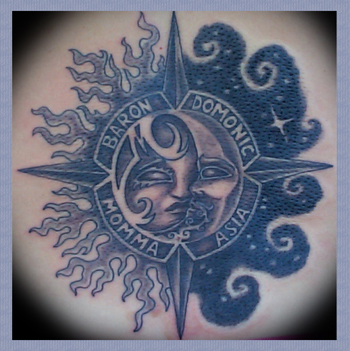 The Navajo Indians, Aztecs, Egyptians, and countless other cultures have worshipped a sun god at one time or another. Most often, there was a sense that the sun could heat the body one a cold day, and thereby keep humans alive and functioning. On the other hand, it was believed that - if the sun god was so displeased - the god could try to kill its worshippers by drying up the land, killing crops and animals, not providing rains for water, and thereby killing people.
The Navajo Indians, Aztecs, Egyptians, and countless other cultures have worshipped a sun god at one time or another. Most often, there was a sense that the sun could heat the body one a cold day, and thereby keep humans alive and functioning. On the other hand, it was believed that - if the sun god was so displeased - the god could try to kill its worshippers by drying up the land, killing crops and animals, not providing rains for water, and thereby killing people.
In Egypt, the sun god was called Ra - depicted with a hawk head in many ancient characters. Ra was said to be the creator - the one who cried as he created the Earth (because it was so beautiful when he had finished) that the tears fell to the earth, and became people. Celtics actually had an ancient sun god by the name of Lugh. The Native Americans spoke of Tsohanoai, the god who carried the sun upon his back - across the sky - everyday. At night, he hung the sun from a peg in his house. Hence, that is why the moon is not as bright as the sun. The Aztec god, who also seemed the hardest to please, was named Huitzilopochtli. He was the sun and the war god, and was continuously offered human sacrifices to secure the plentiful ness of rain, as well as victory in wartimes.
The sun still gets its shining moment in today's tattoos (sorry about the pun). As cool as a sun tattoo had been in the past, it seems to have fallen by the wayside - replaced by other celestial bodies like the stars or moon. It still holds its place in background scenery upon tattoos though. Tattoos depicting an eagle flying through the blue sky, as the sun glints off its widespread wings, or a wolf perches on a rock face as the sun slowly seeps up behind a dark mountain the background, still utilize the sun as a shadowing assistant.
It still holds its place in background scenery upon tattoos though. Tattoos depicting an eagle flying through the blue sky, as the sun glints off its widespread wings, or a wolf perches on a rock face as the sun slowly seeps up behind a dark mountain the background, still utilize the sun as a shadowing assistant.
When working at my family business as a teenager, it seemed that one of my stepfathers' best customers always came in bearing a new tattoo. His most significant tattoo on his body took up just about his entire back. It was a Native American Chief in full headdress, with his hands and face upturned to the sky, as if in prayers of thanks. On his left side, an eagle flew in the sky. The shadow of the eagle seemed to fall into the chief.
 On the opposite side, a shadow exited the chief - shaping itself into that of a bear. So, to say that a sun tattoo is just that - a sun - really hides the true nature of shadowing. As anyone who has ever gotten a tattoo can attest, shadowing is one of the most critical pieces in a tattoo.
On the opposite side, a shadow exited the chief - shaping itself into that of a bear. So, to say that a sun tattoo is just that - a sun - really hides the true nature of shadowing. As anyone who has ever gotten a tattoo can attest, shadowing is one of the most critical pieces in a tattoo.

Grab The Bookmarketer For Your Site